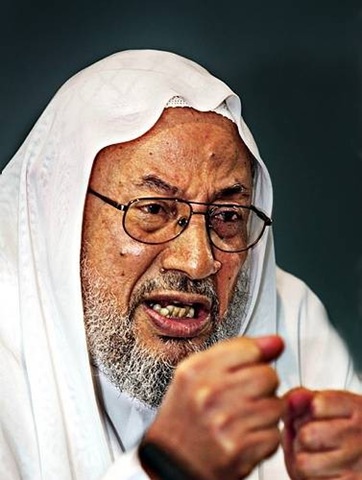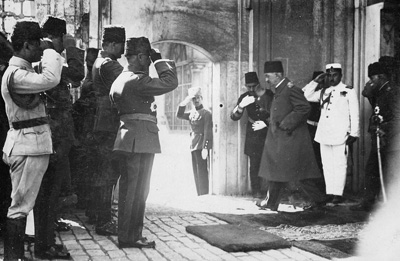
ISIS has invented nothing for it to be qualified in any sense as ‘sectarian’. Other than its extreme brutality, this group is simply applying to the letter what the Sunnis have always understood by their religion. So, according to a formal logic, the factions of ISIS and al Qaeda are the most coherent groups in the Sunni world – internally coherent, coherent with their archaism, and above all coherent with the single theological juridical version of Islam existing at present, one that is sacralised and promoted by everyone, above all by official Islam [1].
BY SOHEIB BENCHEIKH
WHILE ISIS IS ADOPTING a puritanical, fundamentalist and a ‘to the nth degree’ practice of that which they consider ‘Islam’, the majority of Sunnis – who use absolutely the same texts – are merely manifesting a schizophrenic attitude. They operate according to what is probably an unconsciously subjective selectivity: they observe one part of the text, contemplate another (as a subject worthy of admiration) and relegate a third part to the zone of the ‘unthinkable.’
What ISIS practices in broad daylight is taught and repeated one thousand times over in all the theological faculties of capital cities in the Muslim world. It is broadcast by the sermonisers of any and every mosque, and no doctor of fiqh or hadith can in all truth contradict the practices of ISIS or qualify them as un-Islamic. All he can say is “not like that, not now, not in these circumstances.” But he will not say anything against the foundations or the raison d’être of these practices. He will not say anything because he himself believes – or pretends to believe – that everything the hagiographies of the Prophet and the accounts of hadith have attributed to the first generation of Muslims, enjoys in religion the force of legislation, and sets the norms for all Muslims for all times.
Bedouinizing Islam
Yet to try to turn Muslim law, which emerged from patriarchal societies, into a sort of universal law valid for all times is what I would call a ‘Bedouinisation’ of Islam, which is restricting the evolution of Muslim societies. Justice in one century becomes injustice in another century. The problem is that this theology we inherited was conceived for an Islam that was the religion of the majority and had sovereignty over its lands. Moreover, it was conceived for a tribal and clannic society. This theology was meant for times when nations hardly came into contact with each other – and if they did, it was in a spirit of rivalry for dominance. This theology could not care less about living in harmony with other cultures, and knows nothing of pluralism based on universal principles like secularism and religious freedom – principles that are applicable to all religions and granted to all.
A true faith, but a sclerotic theology
The problem is the confusion of faith with theology. Faith is not theology. If faith is a mystery that transcends the intellect of man, theology – this discourse on God – is a provisory attempt to elucidate faith by intelligence. The minds of scholars of all ages and all religions should remain alive to this distinction between faith and theology to prevent stagnation in a theology of a given historical moment and to ensure the universality of a living faith. It is this distinction that is lacking today. For each generation, each group inhabiting a specific region, reads the Qur’ān in the light of its own concerns and aspirations. This constitutes the breach where what is temporary and is changing in nature, becomes bound up with the timeless, the intangible and the eternal.
Many Qur’ānic verses encourage the Muslim to renew his understanding, and above all not to be content with the results obtained by ancestors. Indeed, in Islam the believer has freedom of interpretation. Islam is a liberal religion – and I use that word deliberately – and a religion for the individual since it does not have a clergy. Its sole authority is the text – Islam only has one Qur’ān but a multitude of interpretations that vary according to place, conditions, classes and level of culture. This is what, in my opinion, constitute its richness and suppleness, and its eternal youth. And as a corollary, no particular interpretation is to be imposed by force, by any form of intimidation for fear that this would set it adrift.
This theology could not care less about living in harmony with other cultures
But today we are all fully adrift, due to the groups who seek to impose a single, literalist and obscurantist interpretation of the texts – by which I mean the Wahhābī or Salafist groups that seek to imitate, down to the last millimeter, the example of the Prophet Muhammad! But the Prophet was so intimately bound to his century and anchored in the culture and way of life of his era that it is impossible to believe that he would have wanted to impose his example on the centuries that followed. Any attempt to imitate in the 21st-century the way he dressed, how he ate or how he behaved, is pure madness. This type of abject imitation only serves to marginalise Islam in the modern world. The Prophet never demanded that the Muslim should live on the margins of his own century. To follow the sunna or ‘tradition’ does not mean going back to the first century of the hegira; it means following a path adapted to the present century.
Islam is emerging from a centuries-long decadence where that creative and interpretative intelligence has gone into deep hibernation. During these centuries, Muslims were faced with a theological legacy that went far beyond their capacity to understand it, while it is they who should have been nurturing this legacy or even calling it into question. At one point they sacralised not just Islam, but also the theological endeavours of their ancestors. Take the example of the Taleban; they do not apply the Qur’ān, or rather, if they apply certain bits of it, this is always via the most archaic and anachronistic interpretation of it. They apply an Islamic law which is not, as they maintain, divine but rather the fruit of human endeavour, one that was elaborated over a period from the 9th to the 12th centuries, and which has subsequently become sacralised. And they dare call this the Sharīʻa! The word Sharīʻa is actually a mystical term – the’ way that leads to God’. Any attempt at reforming Islam – and Islamic law in particular – must therefore pass through a desacralisation process, through the re-reading of texts in the light of the modern intellect. Either Islam marches in step with its time, or it will remain on the margins of modern society.
De-couple faith from the state
We hear much talk of an ‘Islamic state’ in one form or another. But the first heresy of the Islamic faith in the 20th century was its politicisation. From the moment the Muslim countries achieved independence was born something termed ‘political Islam’, that is, an Islam dictated by the state which only obeys the state, and is nothing but an organ of the state. The state pays the salaries of the imams, and it is the state which promotes Islam – but what sort of Islam? An Islam that does not recognise the ‘citizen’ but only knows the ‘subject’, that does not recognise the state of law but only the law of the prince. An Islam which does not recognise the democratic vote, the free expression of a sovereign people, but rather only recognises the pledge of allegiance. I am convinced that the Muslim state only teaches the polar opposite of what it pretends to be through its teaching of an unreformed Islam conceived for a tribal, patriarchal, traditional society.
Muslims will not forever be able to dodge the true debate
Can Islam only survive with a political rule defending it? [2] If Islam is perceived as a satisfying religion, the rising light, it will never need power to force people, if it is superior. It will survive as values, norms and ideals of life, and not imposed upon others. We have to advocate Islam as a religion that exists within every individual’s heart and not demand the state to preserve the sustainability of our religion. Obedience or disobedience is not the state’s responsibility. It must be our direct relation with God, without any intervention from men.
Debate stillborn
It is up to us Muslims who are versed in religious science to make the distinction, in the minds of Muslims and non-Muslims alike, between a religion based on the one hand on spirituality, humanism, and civilization, and on the other a purely instrumental use of religion, which aims at seizing worldly, material power.
Yet, so far, Muslim societies still refuse to open the debate. On the contrary, to raise these questions in public today is to subject yourself to the most unlikely censures and accusations – of being in the pay of the West, of serving American interests, or conniving with the Zionist enemy – of manifesting one’s apostasy and thus deserving of the death penalty.
The only idea that, in some small way, comforts me is that Muslims will not forever be able to dodge the true debate. Cornered by the succession of atrocities committed by ISIS and Co., they will have to admit that the cause of the crisis stems not from a well-engineered conspiracy on the part of non-Muslims; for this terrorism in its most abject forms is a direct product of their own terrain. It comes from this subculture, this neurosis about identity and this long fossilised, empty theology. In the face of the onrush of events, they will have to open the door, little by little, to the winds of secularisation, and favour the privatisation of faith and the promotion of an individual conscience.
[1] Dr Soheib Bencheikh is a distinguished scholar and former Grand Mufti of Marseilles, he holds a doctorate in Religious Sciences from the École pratique des hautes études Paris, and is a founding member of the Conseil français du culte musulman (Council of French Muslims) (Ed.)
[2] The Islamist luminary Shaykh al-Qaradawi is famous for his following dismissal of secularism for the Islamic world: “The [Christian] faith remains standing … without the state exercising any control over them. This contrasts with what would happen if the Islamic state did this. The result would be that the faith would be left without any authority to support it, or force to maintain it.” Al-Islām wal-ʽalmāniyya wajh-an li-wajh, Section 2.2 (Ed.)


